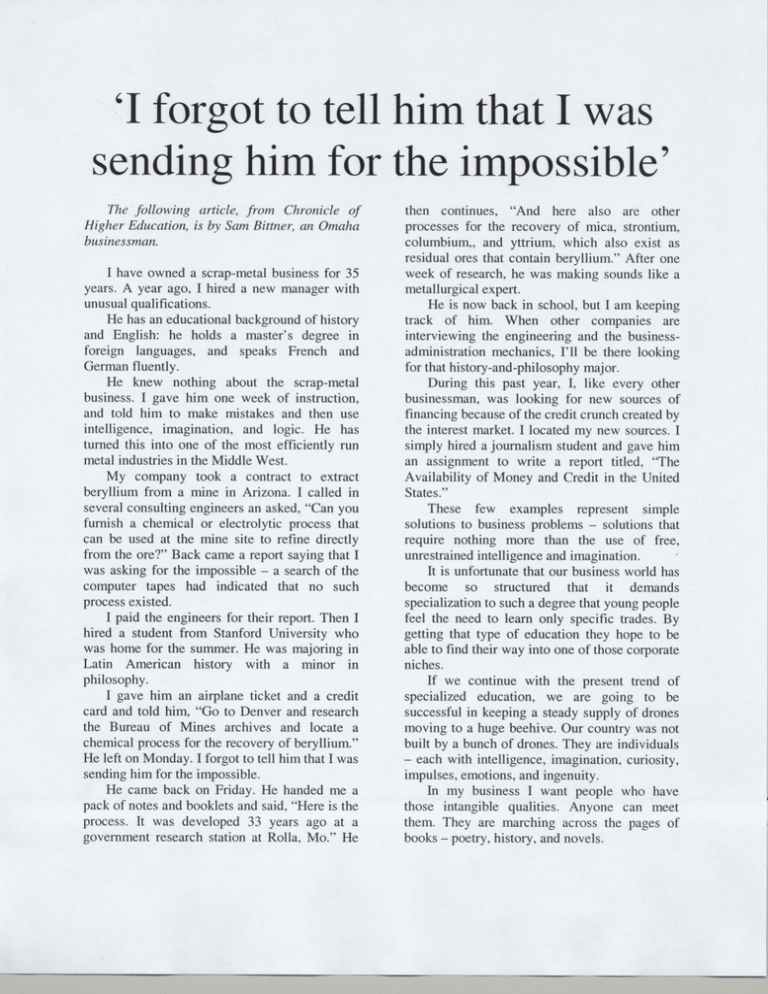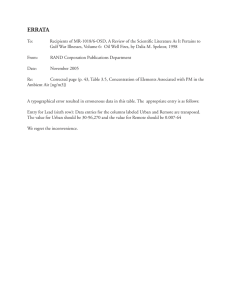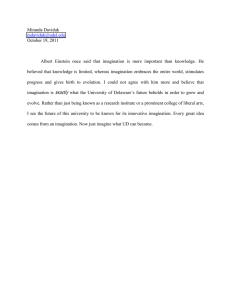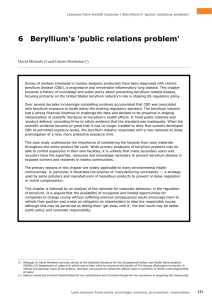I forgot to tell him I was sending him for the impossible
advertisement

'I forgot to tell him that 1 was sending him for the impossible' The following article, from Chronicle of Higher Education, is by Sam Bittner, an Omaha businessman. I have owned a scrap-metal business for 35 years. A year ago, I hired a new manager with unusual qualifications. He has an educational background of history and English: he holds a master's degree in foreign languages, and speaks French and German fluently. He knew nothing about the scrap-metal business. I gave him one week of instruction, and told him to make mistakes and then use intelligence, imagination, and logic. He has turned this into one of the most efficiently run metal industries in the Middle West. My company took a contract to extract beryllium from a mine in Arizona. I called in several consulting engineers an asked, "Can you furnish a chemical or electrolytic process that can be used at the mine site to refine directly from the ore?" Back came a report saying that I was asking for the impossible - a search of the computer tapes had indicated that no such process existed. I paid the engineers for their report. Then I hired a student from Stanford University who was home for the summer. He was majoring in Latin American history with a minor in philosophy. I gave him an airplane ticket and a credit card and told him, "Go to Denver and research the Bureau of Mines archives and locate a chemical process for the recovery of beryllium." He left on Monday. I forgot to tell him that I was sending him for the impossible. He came back on Friday. He handed me a pack of notes and booklets and said, "Here is the process. It was developed 33 years ago at a government research station at Rolla, Mo." He then continues, "And here also are other processes for the recovery of mica, strontium, columbium" and yttrium, which also exist as residual ores that contain beryllium." After one week of research, he was making sounds like a metallurgical expert. He is now back in school, but I am keeping track of him. When other companies are interviewing the engineering and the businessadministration mechanics, I'll be there looking for that history-and-philosophy major. During this past year, I, like every other businessman, was looking for new sources of financing because of the credit crunch created by the interest market. I located my new sources. I simply hired a journalism student and gave him an assignment to write a report titled, "The Availability of Money and Credit in the United States." These few examples represent simple solutions to business problems - solutions that require nothing more than the use of free, unrestrained intelligence and imagination. It is unfortunate that our business world has become so structured that it demands specialization to such a degree that young people feel the need to learn only specific trades. By getting that type of education they hope. to be able to find their way into one of those corporate niches. If we continue with the present trend of specialized education, we are going to be successful in keeping a steady supply of drones moving to a huge beehive. Our country was not built by a bunch of drones. They are individuals - each with intelligence, imagination, curiosity, impulses, emotions, and ingenuity. In my business I want people who have those intangible qualities. Anyone can meet them. They are marching across the pages of books - poetry, history, and novels.




